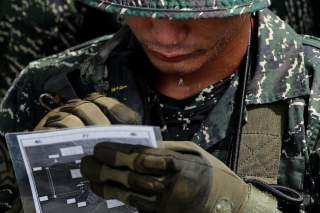The United States Must Be Realistic on Taiwan
There is a small probability that China will emerge as a genuine aggressor state. In that case, a defensible “red line” will have to be drawn, but Taiwan is precisely the wrong place to draw that potentially very important line.
The single military strategy point Chang makes that could have some merit is the assertion that Taiwan is the “cork in the bottle” that constrains Chinese military development. Yet, even this well-tried Cold War maneuver has weaknesses too. For one, the Taiwan issue provides China with a very clear military focal point that can be employed in Beijing to raise ever more resources for developing PLA high-tech, power-projection forces—as has been the case since the 1995–96 crisis. Whatever China’s real interests in various “far seas” locales like the Gulf of Aden, the Chinese Navy has few worries when it comes to the fight for a larger budget, since it can always argue that the Taiwan scenario is both urgent and requires a massive buildup. Even more distressing, the same major PLA forces that are relevant to a Taiwan scenario can also be put to other unpleasant uses—for example in the South China Sea. Another strategic weakness of the “cork” argument is that allied forces put in place to defend that cork will be intensely vulnerable (including for preemption) given their proximity to a whole array of lethal Chinese systems. In other words, one of the best reasons to pull back certain U.S. forces from the first island chain in the near term is indeed the hope that these same forces would survive the first phases of combat in a hypothetical war in order to win the larger conflict. That is a common sense strategy even if it makes certain allies uncomfortable.
Yet another salient problem with this strategy is that in the zero-sum world this policy approach posits, one cannot doubt that Beijing will counter by seeking to find a cork to put in the U.S. bottle. Indeed, there is already some evidence that Chinese strategists are exploring the notion of developing pressure against the United States in the Atlantic Ocean, for example. It may not be long before the Chinese Navy is making regular transits through the GIUK Gap in the North Atlantic, while China's ambitions in the South Atlantic area are also becoming more visible. Is that kind of hot rivalry outcome advantageous to U.S. interests? A final obvious point is that the “cork” is all well and good until sufficient pressure builds up to blow out the cork, which happens to be the case at present. The people of Taiwan quite understandably do not want to be the exploding champagne bottle for a PRC party, and this ugly scenario can and must be avoided with creative and constructive diplomacy among Taipei, Beijing and Washington.
I have offered in my 2015 book a step-by-step process of de-escalation via “cooperation spirals.” Any peace process is, almost by definition, imperfect, as it necessarily involves compromises. But it is well past time to bring this “family quarrel” to a conclusion through the impressively pragmatic framework of “one-country, two systems. [一国两制]” Washington would be wise to facilitate this process and not obstruct it, since it actually serves U.S. interests and would strengthen global order, while assuring Taiwan a high level of autonomy within a confederation-type framework. In the above book, I have also argued that there is a small probability that China actually emerges as a genuine aggressor state (however unlikely). In that case, a defensible “red line” will have to be drawn, but Taiwan is precisely the wrong place to draw that potentially very important line.
Chang wrote a book in 2001 titled The Coming Collapse of China. This asinine title causes most genuine China specialists to chuckle—though many journalists and ideologues have admittedly been quite enraptured by the notion. No doubt, the book has sold well. But American diplomats and defense officials know better than to rest strategies on proven failures of judgment.
Lyle J. Goldstein is Research Professor in the China Maritime Studies Institute (CMSI) at the United States Naval War College in Newport, RI. In addition to Chinese, he also speaks Russian and he is also an affiliate of the new Russia Maritime Studies Institute (RMSI) at Naval War College. You can reach him at [email protected]. The opinion in this article are entirely his own and do not reflect the official assessments of the U.S. Navy or any other agency of the U.S. government.

